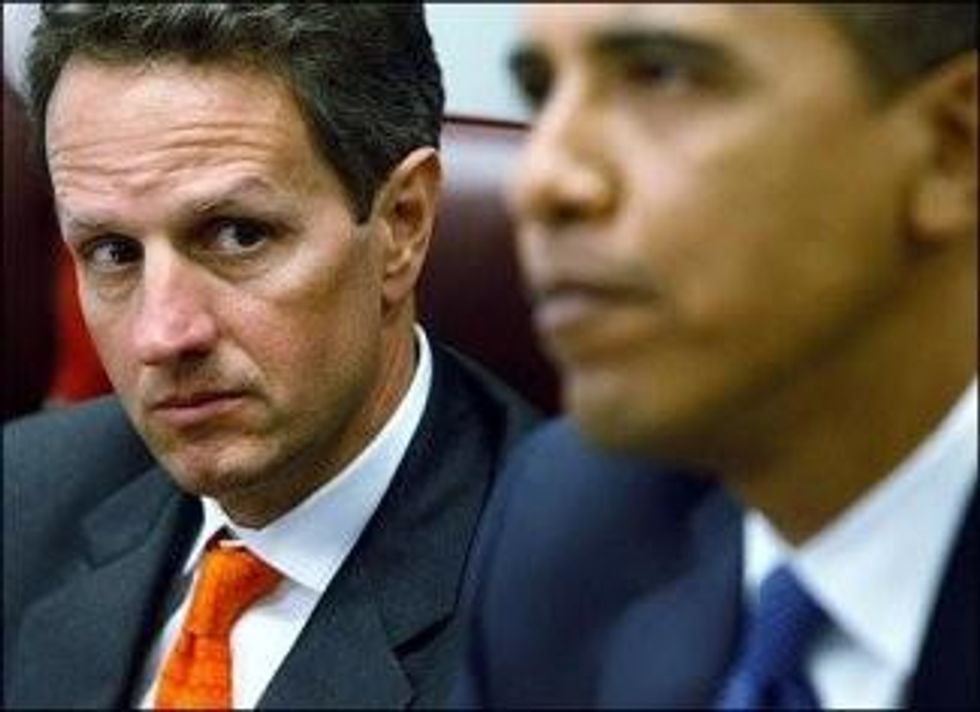Reviewing "Confidence Men" -- Ron Suskind's new book critically examining President Obama's management of the financial crisis -- The New York Times' Michiko Kakutani ponders this mystery raised by Suskind:
[] Mr. Suskind suggests that the administration's problems in dealing with the fiscal crisis began with the president's choice of his economic team. He wonders why Mr. Obama turned away from the advisers who had seen him through the campaign (including more progressive thinkers like Mr. Stiglitz, Robert Reich and Austan Goolsbee), and relied instead on two men associated with the deregulatory policies of the past, Mr. Geithner, the Treasury secretary, and Mr. Summers, the chief economic adviser. Both men had served in the Clinton administration (with Treasury Secretary Robert E. Rubin, who would later join Citigroup as a senior adviser and board member); their actions, Mr. Suskind contends, "had contributed to the very financial disaster they were hired to solve."
Of course, one might ask the same of Obama's penchant for filling the most important positions in his administration -- including his Vice President, Secretary of State, and Defense Secretary -- with supporters of the Iraq War. But about Geithner, Suskind unwittingly solved the mystery he raised: Kakutani notes that "one top banker quoted in these pages refers to [Geithner] as 'our man in Washington' for helping avert more systemic changes affecting Wall Street."
Geithner wasn't chosen and hasn't remained despite being "associated with the deregulatory policies of the past" and despite being the bankers' "man in Washington." He is empowered precisely because of those facts, as was pointed out even before Obama's inauguration. That Geithner and Summers were empowered after enabling the financial crisis through Wall Street subservience isn't a mystery; it's the explanation (And just by the way, replacing the word "despite" with the phrase "because of" is -- in general -- one of the most valuable tools for translating Washington propaganda into reality; here is an excellent example showing how that works, from the first paragraph of a New York Times article two weeks ago:
Documents found at the abandoned office of Libya's former spymaster appear to provide new details of the close relations the Central Intelligence Agency shared with the Libyan intelligence service -- most notably suggesting that the Americans sent terrorism suspects at least eight times for questioning in Libya despite that country's reputation for torture.
Note how the paragraph instantly transforms from misleading nonsense into obvious truth simply by changing "despite" to "because of"; this repeatedly is an effective instrument for deciphering propaganda -- e.g., the U.S. continues to brutalize people in the Muslim world "despite" the fact that doing so produces more Terrorism and thus ensures Endless War.)
Perhaps most notable about the Suskind chapter on which Kakutani focuses is the process by which Obama featured progressive economists during the campaign, only to immediately subordinate them to Wall-Street-subservient officials once in power. Feigning progressive leanings for political gain is Obama's modus operandi; as Matt Taibbi recently put it in explaining why he no longer listens to Obama's speeches:
I remember following Obama on the campaign trail and hearing all sorts of promises before union-heavy crowds. He said he would raise the minimum wage every year; he said he would fight free-trade agreements. He also talked about repealing the Bush tax cuts and ending tax breaks for companies that move jobs overseas.
It's not just that he hasn't done those things. The more important thing is that the people he's surrounded himself with are not labor people, but stooges from Wall Street. Barack Obama has as his chief of staff a former top-ranking executive from one of the most grossly corrupt mega-companies on earth, JP Morgan Chase. He sees Bill Daley in his own office every day, yet when it comes time to talk abut labor issues, he has to go out and make selected visits twice a year or whatever to the Richard Trumkas of the world.
Listening to Obama talk about jobs and shared prosperity yesterday reminded me that we are back in campaign mode and Barack Obama has started doing again what he does best -- play the part of a progressive. He's good at it. It sounds like he has a natural affinity for union workers and ordinary people when he makes these speeches. But his policies are crafted by representatives of corporate/financial America, who happen to entirely make up his inner circle.
That's why -- after 2 1/2 years -- we suddenly see an outburst of "fighting for jobs" and, now, a call to raise taxes on the rich. He does that precisely because everyone -- especially the rich -- knows it will not and cannot happen. We're now formally in (re-)election season, so it's time again to haul out the progressive music. Some Democrats are honest and cynical enough to acknowledge that Obama is doing all these things purely for political gain and -- because his re-election is their top priority -- to celebrate it even while acknowledging it will never become reality (see here and here as examples). From that perspective, I suppose having him give speeches where he advocates for jobs and taxes on the rich is preferable to his endorsing austerity and Reaganomics as he had been doing for months But whatever else is true, none of this presages an actual change in how the government functions or, especially, on whose behalf it labors. That's precisely why he feels free to advocate such things without alienating his funding base. It's still the government of Tim Geithner and his bosses/owners; election season (combined with rising elite fear of social unrest) just requires a bit more pretense to obscure that fact.
Read more at Salon.com


